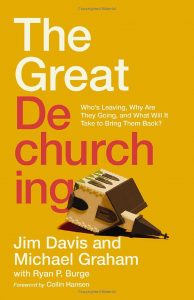Quiet quitting. Conscious uncoupling. The great dechurching. The “dones.” These are the terms coined to describe today’s historic downturn in church affiliation, including evangelical congregations.
“More than one in 10 Americans — around 40 million of us — stopped attending church in the last 25 years,” reported Christianity Today. “There’s no denying the decline in church attendance.”
But there is denying it.
Focus on the Family argues that stories about evangelical church decline are a “myth” promoted by liberals and that “liberal churches are hemorrhaging members” while “biblical churches are holding strong,” growing or even exploding.
In May, the Southern Baptist Convention, America’s largest evangelical denomination, reported losing 457,371 members from 2021 to 2022, its “largest single-year numerical drop in more than 100 years,” according to the SBC’s Lifeway Research. “In total, Southern Baptist churches have suffered membership declines of about 3% annually the past three years.”
“Despite what you may hear, conservative, evangelical churches are, in fact, growing.”
Yet in July, Focus on the Family again promoted its contrary claim: “On the surface, it may appear that Americans are leaving the pews in droves. And there is some truth to that. However, that’s not the whole truth. Some churches are losing members. But it is actually the more liberal churches that are dying. … Despite what you may hear, conservative, evangelical churches are, in fact, growing.”
Focus supports its claim by citing its own previous articles, some of which cite a 2019 book by its own cultural analyst and writer Glenn T. Stanton, The Myth of the Dying Church: How Christianity is Actually Thriving in America and the World.
The central claim is simple: “Churches that are faithfully preaching, teaching and practicing biblical truths and conservative theology are holding stable overall,” writes Stanton, who also contributes to conservative media outlets.
“Is Christianity really going the way of the VHS tape?” he asked in a 2019 article for Fox News. “No. As President Ronald Reagan once said of liberals: ‘It isn’t so much that liberals are ignorant. It’s just that they know so many things that aren’t so.’”
Stanton’s claims were accurate in decades past. Even today, Mainline Protestant churches continue their historic losses. But his claims about evangelical vitality were disproved by the time his book was published.
“His claims about evangelical vitality were disproved by the time his book was published.”
Overall church membership has slowed or declined in the two largest evangelical denominations, the SBC and the Assemblies of God, according to Ryan Burge, a pastor, professor, leading church statistician and co-author of The Great Dechurching.
 The book, to be published Aug. 22 by Zondervan, claims we are now witnessing “the largest and fastest religious shift in U.S. history.”
The book, to be published Aug. 22 by Zondervan, claims we are now witnessing “the largest and fastest religious shift in U.S. history.”
“Denominations are declining, including the SBC,” Burge wrote in an email response to BNG. It’s a “bloodbath” for the Mainline, but evangelical denominations are slipping, too. “The Assemblies of God was increasing at a good clip for half a century, but it has slowed,” said Burge, who regularly posts detailed analysis of religious trends.
One evangelical denomination supports Focus’s claim that evangelical churches are growing. The 50-year-old Presbyterian Church in America has grown steadily.
But the PCA is a small denomination whose stellar numbers don’t offset the broader evangelical decline. The PCA’s 2022 membership of 382,209 is fewer than the number of Southern Baptists who disappeared in 2022.
There’s also one huge question mark in church statistics: nondenominational churches. They claim they’re growing, and experts agree, but their numerical size and trends are a mystery.
In a 2019 podcast, Stanton claimed the growth of megachurches supports his claims of evangelical ecclesiastical vitality, saying, “Megachurches do not happen in an atmosphere of a declining church. They just simply don’t.”
“Megachurches are sucking up folks from other denominations. They aren’t adding water to the bathtub.”
Ryan Burge dismissed that claim as “nonsensical,” as others have previously done.
“Megachurches are sucking up folks from other denominations,” Burge said. “They aren’t adding water to the bathtub. They are just swirling it around a bit.”
“White evangelicals should panic,” wrote the late Michael Gerson, who decried the great dechurching in a 2019 column: “About 26% of Americans 65 and older identify as white evangelical Protestants. Among those ages 18 to 29, the figure is 8%. Why this demographic abyss does not cause greater panic — panic concerning the existence of evangelicalism as a major force in the United States — is a mystery and a scandal.”
Focus on the Family promotes panic about many cultural trends. Why no panic about evangelical church trends?
One of Stanton’s goals in writing the The Myth of the Dying Church was encouraging parents who hear too much bad news about their inability to pass on their faith to their children, he said in a 2019 interview. (He did not respond to requests for comments for this article.)
Examples of his encouraging tone can be found elsewhere in his book, as when he writes, “Raising our children to hold onto a living faith is nearly guaranteed. It’s relatively simple, and any parent can do it.”
Focus also prides itself on owning the libs and countering mainstream media reports, including reports on evangelical church decline. Focus’s conservative news outlet, The Daily Citizen, “provides a faith-based perspective to counter the mainstream media’s anti-Christian bias.”
“One recent article … countered reports that July’s temperatures were the hottest ever recorded.”
One recent example is the article “There is No Need to Worry or Fear the Weather,” which countered reports that July’s temperatures were the hottest ever recorded.
That article said: “Media outlets have long loved reporting on extreme weather. It used to sell newspapers — today it results in lots of clicks. To be sure, parts of America have been hot this summer. But the hottest ever? It’s impossible to know. … There are many reasons for the hype and alarm, of course, ranging from ignorance to arrogance. But there’s also a growing trend to deny God’s sovereignty in our lives.”
If Focus acknowledged that evangelical churches are losing members, it might need to acknowledge the reason many departing young people cite — the bitter, partisan politicization of the church.
But Focus says political activism exhibits evangelicalism’s vibrancy in the article, “Is Politics Hindering the Gospel?”
“Certainly, the effectual spread of the gospel is of paramount importance to all Christians,” the article states. “But to read numerous articles in elite publications today, one would think the precious gospel of Jesus Christ is being dangerously crippled by the nastiness of current partisan politics. … We grow tired of the elite media’s faux concern for something it despises: the effectiveness of the gospel.”
Related articles:
I asked people why they’re leaving Christianity, and here’s what I heard | Analysis by Brandon Flanery
These Christians are leaving behind the church, but not their faith | Analysis by Mallory Challis
Why I’m leaving my church: A theology of death | Opinion by Keith Hovey
The costly victory of evangelicals and Catholics | Analysis by Rodney Kennedy


